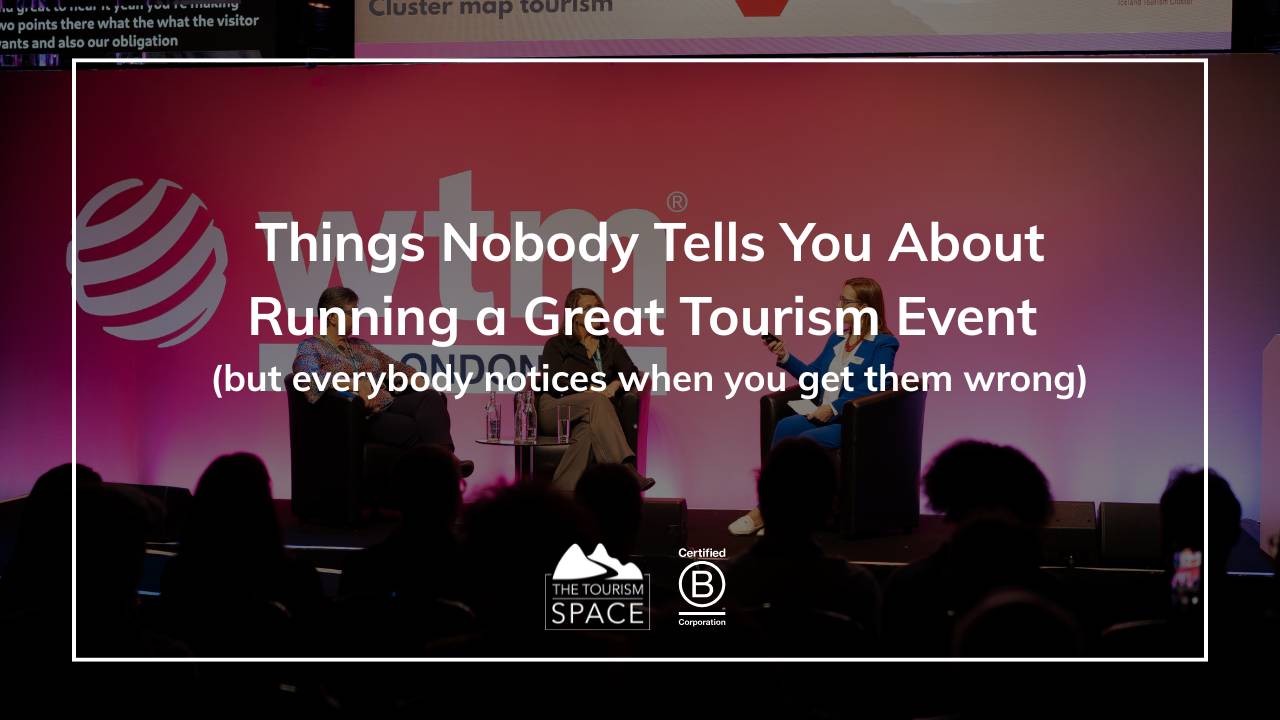
Things Nobody Tells You About Running a Great Tourism Event
(but everybody notices when you get them wrong)
You work in tourism, not event management.
Yet, every now and then, once a year or just a few times in your career, you're asked to plan “a small event.”
It might be a seminar, a summit, a networking breakfast, a full-blown conference.
Suddenly, you're the one sorting the agenda, curating the speakers, inviting the stakeholders, booking the venue, checking the tech, planning the welcome - all while keeping your day job going
And here's the thing: when it’s your event, it’s a big deal.
It’s your name, your team, your organisation. It needs to feel professional, purposeful - and a little bit memorable.
You want it to run smoothly. You want people to engage. You want to feel calm, in control, and proud of what you’ve pulled off.
But deep down, you might also be a bit terrified.
-
“What if it falls flat?”
-
“What if a speaker goes rogue?”
-
“What if it all feels a bit... amateur?”
-
“What if I’m the one holding it all together while everyone else mingles?”
-
What if nobody shows up?
In the midst of the challenge, everyone gets focused on the big-ticket items - theme, venue, speakers.
Yet it’s often the smaller, seemingly invisible details that make or break the experience - and they usually get thought about too late, or not at all.
10 Things That Make an Event Feel Professional (even if you're not a pro)
Here are ten things that most people don’t think to plan for - but every great event gets right.
-
Start strong
Don’t lead with housekeeping. Open with purpose. Set the tone.
-
Have someone watch the clock, and make sure everyone knows about it
Your MC or timekeeper should protect the agenda like a bouncer at a VIP club.
-
Treat all speakers with respect
Whether they’re local business owners or international experts, brief them well and include them fully in the event, not just their slot.
-
Prep your speakers on what not to say
We’ve a short tips sheet about this – too much to fit for this article so read more about that here.
-
Let your audience know what’s happening
Clear signage, confident transitions, and knowing what comes next make people feel relaxed and held.
-
Make the panel feel like a conversation
3 is an ideal number for a panel – they can chat with the moderator nd each other. 5 leads to the moderator just ticking the box of making sure they all get a few words in.
-
Keep Q&A structured
Unmoderated microphones can kill momentum. Use sparingly and plan ahead.
-
Make Name Tags useful
Use lanyards that hang high, not low. Make the name the biggest text. Include their organisation, not their job title (there isn’t readable room for both). Print on both sides because they always flip.
-
Keep it light, not packed
Avoid over-scheduling the event. No event ever needed more sessions while some clearly need less. Give people space to speak, digest and connect.
-
Close strong
End on a note of meaning and some key takeaways and highlights. Leave the event with energy, and not just a damp “Right, that’s it.”
What to know about Speakers
Here are a few things that speakers really appreciate and also that drive them mad.
They love:
-
Being briefed early and clearly
-
Knowing who the audience is
-
Getting the same respect as every other speaker
-
Being offered water
-
Being invited to lunch or the social bit
They don’t really like
-
Getting their slot changed three times or being given too little time
-
Having to bring up the fee – it’s your budget, be up front about it
-
Finding out someone else was paid and they weren’t
-
Being told “just wing it” (or similar) when they ask for details
-
A poor mic, a dodgy clicker, lots of cables emanating from the podium
What to know about MCs
If you brief your MC well, they will look after a lot on the day for you and also in the run-up to the event. If they are making you feel nervous or overwhelmed, it’s time to find another one.
A great MC…
-
Speaks to and briefs all speakers in advance
-
Chats about detail to the venue representatives
-
Advises on your agenda, timings and transitions well in advance
-
Connects the sessions and themes
-
Knows how to recover a room after something goes off-track
-
Keeps the energy up without making it all about them
-
Keeps everyone on time, without talking about time all the way through (groan!)
-
Has your back, makes you feel calm and like you don’t need to worry
An underprepared MC…
-
Reads the agenda word-for-word
-
Fails to link sessions to each other or to the theme
-
Mispronounces names
-
Fails to wrap up speakers who go over
-
Makes the audience feel awkward, not at ease
-
Talks too much

